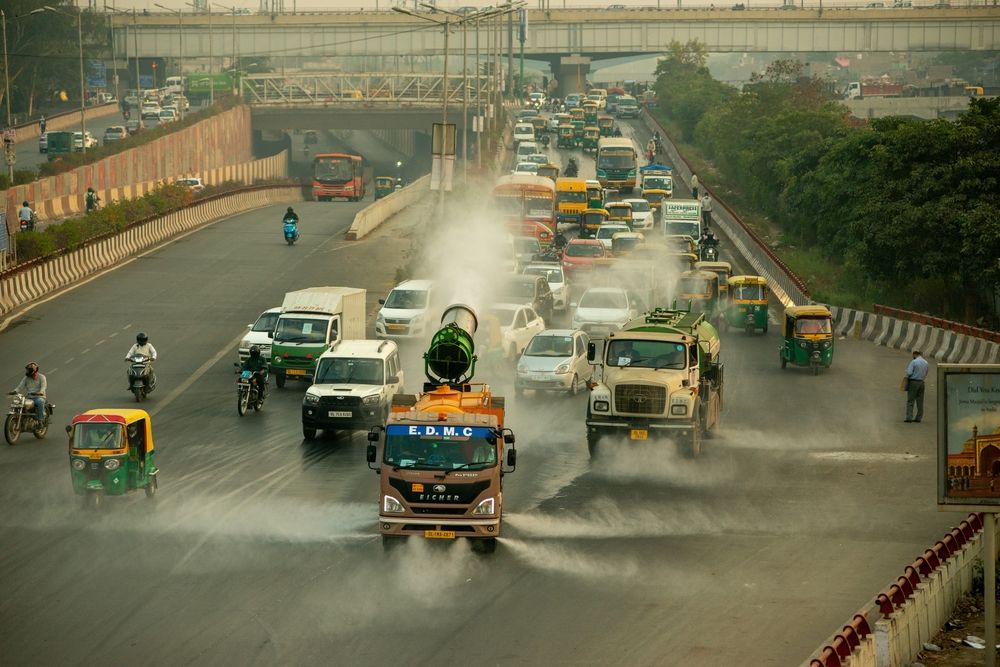Market News
Delhi air pollution crisis: How Delhi’s pollution is disrupting key economic sectors amid restrictions
.png)
5 min read | Updated on November 27, 2024, 11:22 IST
SUMMARY
India’s worsening air pollution health and economy, especially in Delhi-NCR with severe smog disrupting tourism, auto sales, and construction amid GRAP Stage IV restrictions under place banning construction activities and several other impositions.

Recently, some parts of Delhi NCR region witnessed AQI above 1000 levels, adding serious threat to health of people
India’s worsening air pollution not only affects health but also has a big impact on the economy, especially the smog attributed to vehicle emissions, industrial activity, and farm fires, which is particularly severe in the Delhi- NCR (National Capital Region), leading to business losses across sectors. The experts indicate that the externality cost of pollution is much higher and one cannot assign value to it. To battle the crisis of Air Pollution, authorities at the state government level in Delhi have implemented Stage IV of the Graded Response Action Plan (GRAP).
Measures include:
- Suspension of construction activities.
- Transitioning schools to online classes.
- Restrictions on specific vehicles.
- A proposal for artificial rain to reduce particulate matter.
This leads to sector choking of business operations of sectors such as tourism and hotel, auto, and construction, being the worst affected by smog.
Graded Response Action Plan (GRAP) and its Restrictions
| GRAP Stage | Air Quality | AQI | Restriction |
|---|---|---|---|
| Stage I | Poor | 201-300 | Public advisories, dust control, restrictions on open burning. |
| Stage II | Very Poor | 301-400 | Restrictions on diesel generators, enhanced mechanised cleaning, and road water sprinkling. |
| Stage III | Severe | 401-450 | Ban non-essential construction, limit heavy vehicle entry, and suspend brick kiln operations. |
| Stage IV | Severe Plus | More than 450 | A complete ban on construction, school closures, strict vehicle restrictions (including odd-even schemes). |
(Source: Graded Response Action Plan (GRAP), Ministry of Environment, Forests, and Climate Change)
Impact of Pollution on Health and Productivity
Air Pollution slowly and silently impacts health and productivity, leading to an increase in medical expenses and putting strain on the country's already stressed healthcare systems.
The impact on health will directly affect productivity. Harmful particles in the air will enter the lungs, causing respiratory and cardiovascular issues. It can also increase asthma and lung infections. Pollution will cause people to fall ill and affect their work, resulting in slowing down businesses across all sectors, small, medium, or large, and eventually reducing the economy's overall productivity.
Impact on Business Sectors
Pollution significantly impacts industries like tourism. Delhi's poor air quality, for instance, discourages tourists from visiting the capital during the winter season. Typically, the period from October to March is considered the best time for tourists to explore northern Indian states. However, rising air pollution often deters visitors, leading to a decline in tourism during these months.
How Businesses are Acclimating to Pollution
As pollution affects businesses, businesses are acclimating to the need to improve worker safety and adopt cleaner technologies to minimise its impact on operations. Many industries are turning towards green technologies.
Electric vehicles (EVs) are becoming more common in logistics and transportation sectors, helping reduce carbon emissions. India’s EV market alone is expected to be worth $200 billion by 2030, showcasing the shift toward cleaner technologies.
Renewable energy sources like solar and wind are also gaining popularity, especially in manufacturing and power generation industries. These shifts help companies lower their environmental impact and align with growing consumer demand for sustainable practices, contributing to long-term operational resilience.
Air pollution is a critical issue that demands immediate and concrete action from all stakeholders. However, it also presents an opportunity to focus on clean energy, electric vehicles, and improved industrial practices. By implementing effective, long-term solutions to combat air pollution, India can enhance its economic health while ensuring every citizen's right to good health.
India’s ambitious goal to generate 500 GW of renewable energy by 2030 underscores the nation’s commitment to sustainable growth. Additionally, many Indian companies are adopting eco-friendly practices to minimise waste and pollution.
Investing in renewable energy and sustainable practices not only drives economic growth but also fosters a cleaner environment, creates jobs, and attracts foreign investment. With increasing emphasis on ESG (Environmental, Social, and Governance) compliance, such initiatives contribute to building a greener and more resilient economy.
About The Author

